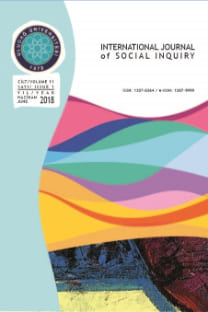Negotiating Heroism in Ben Fountain's Billy Lynn's Long Halftime Walk
heroism, Iraq War, post-heroism, war novel, Ben Fountain
Negotiating Heroism in Ben Fountain's Billy Lynn's Long Halftime Walk
heroism, Iraq War, post-heroism, war novel, Ben Fountain,
___
- Alosman, M. I. M. (2020). Tarnished heroes: Faces of war in American fiction. Şarkiyat: Journal of Oriental Scientific Research, 12(3), 1016–1026.
- Alosman, M. I. M. (2021). Grievable and un-grievable lives: Phil Klay’s redeployment. Humanitas- International Journal of Social Sciences, 9(17), 30–44.
- Barta, D. (2015). Veterans and “Innocensus” in Billy Lynn’s Long Halftime Walk and the Yellow Birds. In P. Petrovic (Ed.), Representing 9/11: Trauma, Ideology, and Nationalism in Literature, Film, and Television (pp. 79–92). Rowman & Littlefield.
- Beck, J. (2009). Dirty wars: Landscape, power, and waste in western American literature. Lincoln University of Nebraska Press.
- Blazer, A. (2015). Logos cowboys: Postmodern football and post-postmodern war in Don DeLillo's End Zone and Fountain's Billy Lynn's Long Halftime Walk [Conference session]. South East Coastal Conference on Languages & Literatures (SECCLL). Georgia, United States. https://digitalcommons.georgiasouthern.edu/seccll/2015/2015/40
- Coker, C. (2002). Waging war without warriors? The changing culture of military conflict. Lynne Rienner Publishers.
- Coker, C. (2007). The warrior ethos: Military culture and the war on terror. Routledge.
- Coker, C. (2014). Men at war: What fiction tells us about conflict, from The Iliad to Catch-22. Oxford University Press.
- Dyer, G. (2012, May 20). Americaʼs team. The New York Times. https://www.nytimes.com/2012/05/20/books/review/billy-lynns-long-halftime-walk-by-ben-fountain.html
- Fountain, B. (2012). Billy Lynn's Long Halftime Walk. Harper Collins Publishers.
- Gregory, D. (2004). The colonial present. Blackwell.
- James, W. (1971). The moral equivalent of war, and other essays. Harper & Row.
- Johnston, C. (2017). Postwar reentry narratives in Leslie Marmon Silko’s ceremony and Ben Fountain’s Billy Lynn’s Long Halftime Walk. Studies in the Novel, 49(3), 400–418.
- Kaiserman, A. (2021). Unreality in America: Reading Billy Lynn’s Long Halftime Walk in a post-truth age. Critique: Studies in Contemporary Fiction, 62(5), 574–585.
- Luttwak, E. N. (1995). Toward post-heroic warfare. Foreign Affairs, 74(3), 109–22.
- O’Brien, S. (2021). Trauma and fictions of the “War on Terror”: Disrupting memory. Routledge.
- Ryan, C. (2014). The Dilemma of cosmopolitan soldiering. In S. Scheipers (Ed.), Heroism and the changing character of war: Toward post-heroic warfare? (pp. 120–141). Palgrave Macmillan.
- Scheipers, S. (2014). Introduction: Toward post-heroic warfare? In S. Scheipers (Ed.), Heroism and the changing character of war: Toward post-heroic warfare? (pp. 1–18). Palgrave Macmillan.
- Scranton, R. (2015, January 25). The Trauma Hero: From Wilfred Owen to Reemployment and American Sniper. Los Angeles Review of Books, 25. https://lareviewofbooks.org/article/trauma-hero-wilfred-owen-redeployment-american-sniper
- Tait, T. (2012, July 6). Billy Lynn's Long Halftime Walk by Ben Fountain – review. The Guardian. https://www.theguardian.com/books/2012/jul/06/billy-lynn-ben-fountain-review
- Williams, B. (2017). The soldier-celebrity in Billy Lynn’s Long Halftime Walk. Texas Studies in Literature and Language, 59(4), 524–47.
- Yanyu, Z. (2017). Transnational landscape and politics in three American Iraqi novels. Foreign Literature, 01, 120–131.
- ISSN: 1307-8364
- Yayın Aralığı: 3
- Başlangıç: 2008
- Yayıncı: BURSA ULUDAĞ ÜNİVERSİTESİ > SOSYAL BİLİMLER ENSTİTÜSÜ
Blokzincir Tabanlı E-Ticaret: Bir Değerlendirme
Ebru AYDOĞAN, Muhammed Fatih AYDEMİR
Ülviye TÜFEKÇİ YAMAN, Serpil AYTAÇ
Fiyat, Gelir ve Faiz Oranlarının Konut Talebi Üzerindeki Etkisi: Panel Veri Yaklaşımı
Rusya Federasyonu-Çin Halk Cumhuriyeti İlişkileri: Çok Kutupluluğun İnşası
